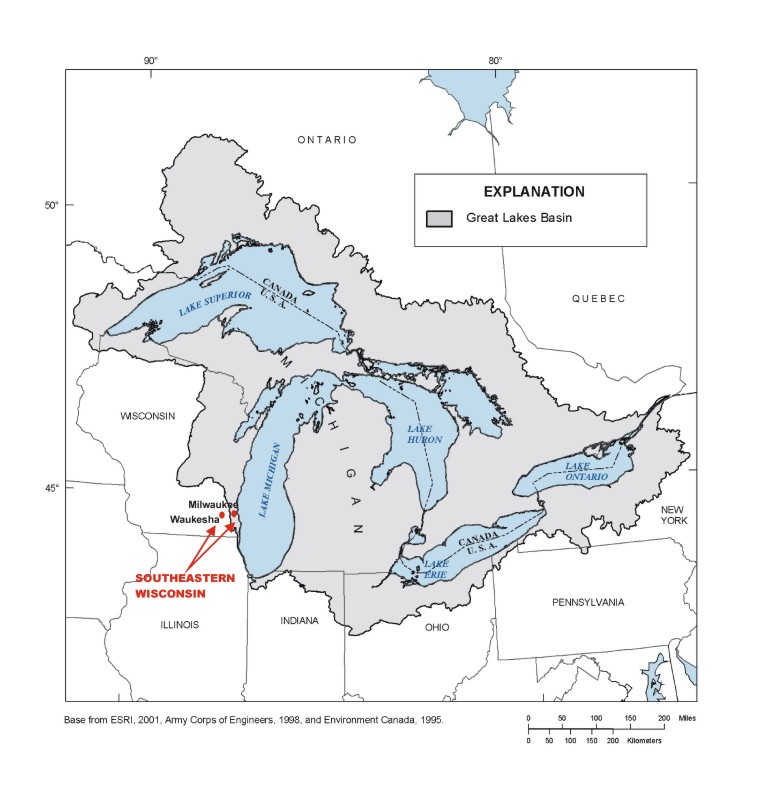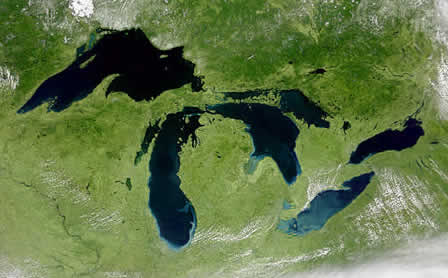 See that smiling dude on the right there? That's Bill Richardson, Governor of New Mexico and presidential hopeful. A couple weeks ago he suggested a National Water Policy, saying that "states like Wisconsin are awash in water."
See that smiling dude on the right there? That's Bill Richardson, Governor of New Mexico and presidential hopeful. A couple weeks ago he suggested a National Water Policy, saying that "states like Wisconsin are awash in water."Translation: Let's take their water!
Unfortunately the Great Lakes are occasionally a political bargaining chip as our national political folks pander to the growing west by offering them our water. Water diversion from the Great Lakes water basin is a very real danger.
Hey, I know. While we're moving Michigan's water to the arid west, let's move Iowa's fertile soil to South Dakota, we'll move Kentucky's coal mines to Minnesota, and as a Michigan resident I've always felt we missed out on trade because we don't have access to the Pacific ocean, so we should shave off portions of the the states between Michigan and the Pacific so we can have the same level of trade as California...which will be fine because all of our fresh water will be in Las Vegas anyway. Everybody wins.
 With six quadrillion gallons, or 5,472 cubic miles of fresh water, the Great Lakes seem like all the fresh water in the world when in fact it's only 20% of all the fresh water in the world. We are indeed awash in water. More like seas than lakes, they affect the weather and are a way of life for the thirty million people who live within the water basin. And yet, it shouldn't be moved to accommodate unsustainable settlements in inherently dry regions. The Lakes are not simply a commodity to be bought and sold.
With six quadrillion gallons, or 5,472 cubic miles of fresh water, the Great Lakes seem like all the fresh water in the world when in fact it's only 20% of all the fresh water in the world. We are indeed awash in water. More like seas than lakes, they affect the weather and are a way of life for the thirty million people who live within the water basin. And yet, it shouldn't be moved to accommodate unsustainable settlements in inherently dry regions. The Lakes are not simply a commodity to be bought and sold.As Michigan loses jobs and citizens to other parts of the country, growing states out west are asking us to help them continue wooing companies and taking our jobs by sending them our water, too. As it turns out, their growth is wildly unsustainable due to an inherent limit to vital resources.
See...these states court national businesses and manufacturing claiming a high standard of living and a clear growth momentum, pointing out that states like Michigan, Ohio, and Pennsylvania are the old guard with an aging infrastructure. Meanwhile they wring their hands about lacking the most essential ingredient to human life and civilization...water. So they come knocking on our door asking for ours, or as Bill Richardson suggests, they simply take it.
Look at civilizations and cities around the world from antiquity on. They tend to be built on or near bodies of water. Without that, growth is unsustainable. It's a historical fact. And the fact is, the very thing that made Chicago, Michigan, Ohio, Pennsylvania, Indiana, and New York important manufacturing and economic centers is the very thing western states don't have enough of. Why should we help them take our jobs by sending them our most precious resource? The most precious resource in the world? And when when the water gets there, will it find its way back into the Great Lakes basin? No. The Great Lakes simply shrink and shrink and shrink.
As climate change continues to exacerbate drought and water shortages, this issue will become more pressing and more political figures will attempt to sell out our resources and eco-system for political gain. We need to tell them to go stuff it. If businesses want our water, they need to move where there's water.






